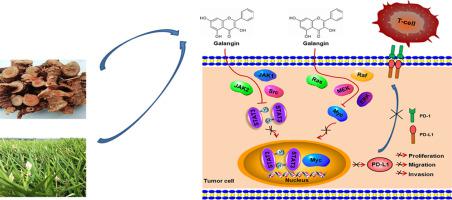Phytomedicine ( IF 7.9 ) Pub Date : 2023-05-20 , DOI: 10.1016/j.phymed.2023.154877 Yi Zhong 1 , Ming Yue Li 1 , Lizhuo Han 1 , Yi Tai 1 , Shen Cao 1 , Jiaxuan Li 1 , Hanyu Zhao 1 , Run Wang 1 , Baojiang Lv 1 , Zhida Shan 1 , Hong Xiang Zuo 1 , Lianxun Piao 1 , Hong Lan Jin 1 , Yue Xing 1 , Xuejun Jin 1 , Juan Ma 1

|
Background
The flavonoid galangin (3,5,7-trihydroxyflavone) is derived from the root of Alpinia officinarum Hance, an edible and medicinal herb. Galangin has many biological activities, such as anti-inflammatory, anti-microbial, anti-viral, anti-obesogenic, and anti-oxidant effects. However, the anti-tumor mechanism of galangin remains unclear.
Purpose
To elucidate the anti-tumor mechanisms of galangin in vitro and in vivo.
Methods
MTT, western blotting, immunoprecipitation, RT-PCR, and immunofluorescence assays were used to assess the mechanism of galangin inhibiting PD-L1 expression. The effect of galangin on T cell activity was analyzed in Hep3B/T cell co-cultures. Colony formation, EdU, migration, and invasion assays were performed to explore the effect of galangin on cancer progression and metastasis. Anti-tumor effects of galangin were investigated in a xenograft model.
Results
Galangin inhibited PD-L1 expression dose-dependently, which plays a major role in tumor progression. Moreover, galangin blocked STAT3 activation through the JAK1/JAK2/Src signaling pathway and Myc activation through the Ras/RAF/MEK/ERK signaling pathway. Galangin reduced PD-L1 expression by suppressing STAT3 and Myc cooperatively. Galangin increased the killing effect of T cells on tumor cells in Hep3B/T cell co-cultures. Moreover, galangin inhibited tumor cell proliferation, migration, and invasion through PD-L1. In vivo experiments showed that galangin suppressed tumor growth.
Conclusion
Galangin enhances T-cell activity and inhibits tumor cell proliferation, migration, and invasion through PD-L1. The current study emphasizes the anti-tumor properties of galangin, offering new insights into the development of tumor therapeutics targeting PD-L1.
中文翻译:

高良姜素通过抑制 STAT3 和 MYC 抑制程序性细胞死亡配体 1 表达并增强 T 细胞肿瘤杀伤活性
背景
类黄酮高良姜素(3,5,7-三羟基黄酮)来源于可食用和可药用的植物良姜的根部。高良姜素具有抗炎、抗微生物、抗病毒、抗致肥胖、抗氧化等多种生物活性。然而,高良姜素的抗肿瘤机制仍不清楚。
目的
阐明高良姜素的体外和体内抗肿瘤机制。
方法
MTT、蛋白质印迹、免疫沉淀、RT-PCR 和免疫荧光分析用于评估高良姜素抑制 PD-L1 表达的机制。在 Hep3B/T 细胞共培养物中分析了高良姜素对 T 细胞活性的影响。进行集落形成、EdU、迁移和侵袭测定以探索高良姜素对癌症进展和转移的影响。在异种移植模型中研究了高良姜素的抗肿瘤作用。
结果
高良姜素剂量依赖性地抑制 PD-L1 表达,这在肿瘤进展中起着重要作用。此外,高良姜素通过 JAK1/JAK2/Src 信号通路阻断 STAT3 激活,通过 Ras/RAF/MEK/ERK 信号通路阻断 Myc 激活。高良姜素通过协同抑制 STAT3 和 Myc 来降低 PD-L1 的表达。高良姜素增加了 T 细胞对 Hep3B/T 细胞共培养物中肿瘤细胞的杀伤作用。此外,高良姜素通过 PD-L1 抑制肿瘤细胞增殖、迁移和侵袭。体内实验表明,高良姜素抑制肿瘤生长。
结论
Galangin 通过 PD-L1 增强 T 细胞活性并抑制肿瘤细胞增殖、迁移和侵袭。目前的研究强调了高良姜素的抗肿瘤特性,为开发靶向 PD-L1 的肿瘤疗法提供了新的见解。



























 京公网安备 11010802027423号
京公网安备 11010802027423号